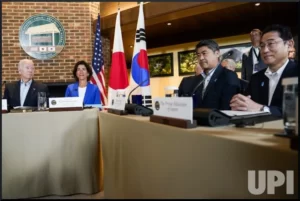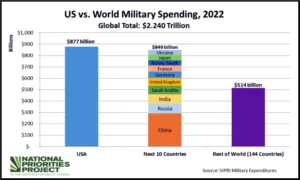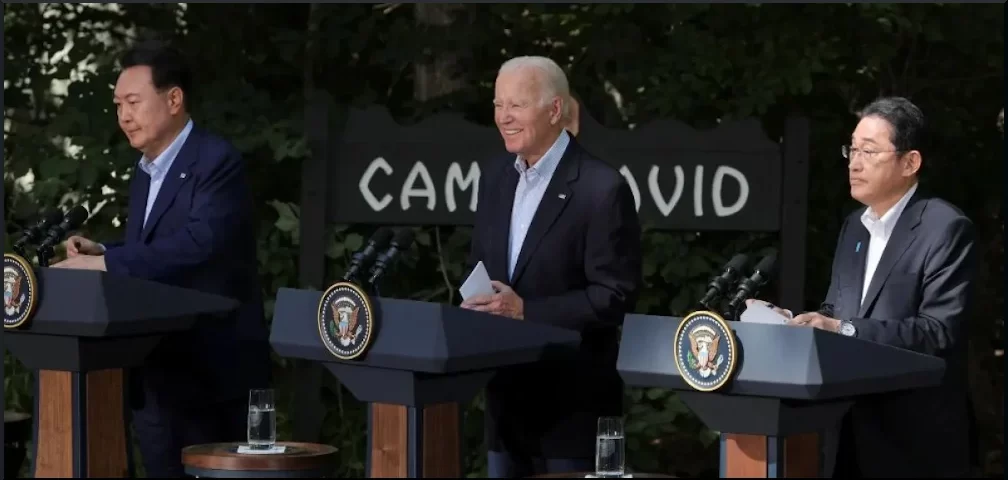by Sara Flounders, published on Workers World, August 22, 2023
U.S. war threats against China heightened this week. On Aug. 18, President Joe Biden framed an aggressive military alliance, with South Korean President Yoon Suk Yeol and Japanese Prime Minister Fumio Kishida dutifully attending, at an ominous summit at Camp David. This trilateral military pact of the United States, South Korea and Japan is directly aimed at China and at the Democratic People’s Republic of Korea (North Korea).
Both U.S. and Chinese, as well as other international media, all described the meeting as a confirmation of a new Cold War against China.
The military pact of South Korea and Japan with the U.S. intentionally damages both the South Korean and Japanese economies, as China has been the major trading partner of both countries. However, right-wing militarists in office in each country seem willing to act against their own people’s interests.
The U.S. government has long maintained separate defense pacts with both countries. Based on Japan’s brutal 35-year colonial occupation of the Korean peninsula, from 1910 to 1945, there remains deep hostility among the Korean people toward Japan. Nevertheless, based on U.S. pressure, the regimes have now become “partners” against China.
U.S. troops have occupied both Japan and South Korea since 1945. There are still 53,700 U.S. troops in Japan on 120 military bases — more bases than in any other country. Some 26,400 U.S. troops are stationed on 73 bases in South Korea, including Fort Humphreys, the largest overseas U.S. military base. This overwhelming U.S. military presence exerts extreme political pressure.
 Whether the recent agreement holds together or not, the Camp David meeting is a further step in Washington’s strategy of inserting tensions, instability and continuing provocations in the region in an attempt to block China’s development and its growing regional trade with its neighbors. Washington is attempting to distract from the economic decline of the U.S. by asserting its military dominance in the Pacific.
Whether the recent agreement holds together or not, the Camp David meeting is a further step in Washington’s strategy of inserting tensions, instability and continuing provocations in the region in an attempt to block China’s development and its growing regional trade with its neighbors. Washington is attempting to distract from the economic decline of the U.S. by asserting its military dominance in the Pacific.
U.S. corporations are the main beneficiaries of a policy that obstructs Japan’s and South Korea’s trade with China. China’s huge economy is a major market for their products, thus aiding the economies of its two neighbors. According to the Wilson Center, China is the top trading partner of more than 120 countries, including Japan, South Korea, Taiwan, the Philippines and Australia. U.S. corporate interests are consumed with the task of how to reverse this economic reality and contain China, especially in the Asia-Pacific region.
This new Camp David military pact follows Washington’s revival and upgrading of the QUAD — the Quadrilateral Security Dialogue among four countries: the U.S., India, Australia and Japan. The Quad holds joint military exercises that openly target China.
Another military alliance — the AUKUS trilateral security pact among the U.S., Australia and Britain — has given cover to U.S. naval and air training missions in the region. Under that pact, the U.S. and Britain will assist Australia in acquiring nuclear-powered submarines.
To highlight the military character of the pact, the meeting was held at Camp David — a military installation and active naval base close to Washington, D.C., staffed by U.S. Marine and Navy personnel.
NATO strategy in Asia
U.S. corporate strategists used the military expansion of NATO, the encirclement of Russia, and years of attacks on Russia’s border by a regime in Ukraine that includes fascist elements — all to block the extensive trade of European Union countries with Russia.
 The U.S. ruling class has used the war in Ukraine to force all the European countries to cut their favorable trade with Russia and impose sanctions. This has led to economic recession in most European Union countries. As sanctions cut off imports of natural gas and oil from Russia, the price of liquified natural gas produced in the U.S. increased.
The U.S. ruling class has used the war in Ukraine to force all the European countries to cut their favorable trade with Russia and impose sanctions. This has led to economic recession in most European Union countries. As sanctions cut off imports of natural gas and oil from Russia, the price of liquified natural gas produced in the U.S. increased.
Washington’s strategy aimed to collapse the Russian economy and impose regime change in Russia. This project failed because first China, and then all the countries of the Global South, refused to go along with the sanctions the U.S. and EU had imposed on Russia.
The U.S. government is attempting a similar strategy to target China in the Asia-Pacific region. Taiwan is today being militarized, as Ukraine was from 2014 to 2022. Meanwhile, the U.S. is cobbling together a series of NATO-style military alliances in the Asia-Pacific region.
By expanding sanctions on China affecting chip technology, software and equipment, Washington disrupts global supply chains and damages the economies of South Korea, Japan and Taiwan. This will boomerang on the U.S. economy. Though China will feel the impact of sanctions, its economy is larger than those of its Asian neighbors, and its many global trading partners may give it a greater capacity to adjust, including by reinforcing its domestic economy.
Military pact increases global insecurity
The biggest and most immediate impact of this military offensive will be felt on the global environment, increasing insecurity. Rather than focusing world attention, resources, and the vast scientific and technical knowhow on the escalating climate disaster, U.S. corporations focus on quick profits from war. Every U.S. politician will feel the pressure to vote for even more increases in military funding.
According to the National Priorities Project, the full military budget of the U.S. is $900 billion — more than the next 10 countries combined and 40 percent of the world total.
While the security pact devised at Camp David won’t reverse the declining economic power of the U.S., it will intensify global insecurity.
Sara Flounders is an American political writer who has been active in ‘progressive’ and anti-war organizing since the 1960s. Sara is Co-Director of the International Action Center (IAC) and a member of the Secretariat of Workers World Party She also frequently writes for Workers World newspaper and publishes articles on the International Action Center website.
